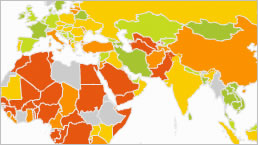| Apr 7, 2021
In the third Plenary meeting for the G20 Global Partnership for Financial Inclusion (GPFI) under the Saudi G20 Presidency, GPFI members were updated on the GPFI’s achieved work in 2020, including the Saudi Presidency’s priority deliverable, “G20 High-Level Policy Guidelines on Digital Financial Inclusion for Youth, Women, and SMEs,” which was endorsed in July by FMCBGs. In addition, GPFI members were provided with an overview of the G20 Financial Inclusion Action Plan Progress Report 2017-2020; the finalized 2020 Financial Inclusion Action Plan (FIAP), which reflects the future work of the GPFI for the next three years; and the 2020 Terms of Reference (ToR), which is the last milestone that marks the completion of GPFI’s work program and structure on streamlining “A Roadmap to 2020” that
| Oct 20, 2020
The 2020 G20 FIAP—a revision of the earlier 2010, 2014 and 2017 editions—comes at a time of crisis, as the COVID-19 pandemic represents an extraordinary global challenge that is having a profound impact on the global economy, including challenges for individuals and businesses, especially those related to financial inclusion. The GPFI will be responsive to new global issues as they arise, adequately frame the Partnership’s work to reflect current circumstances and address the crisis impact and the post-crisis economic effects. The GPFI reaffirms the G20 Leaders’ commitment to advance financial inclusion benefiting all countries and all people, including vulnerable (such as elderly people, migrants and forcibly displaced persons) and underserved groups (including the poor, women, youth, and
| Oct 20, 2020
The G20 Financial Inclusion Action Plan (FIAP) Progress Report 2017-2020 provides a review of the work of the G20 Global Partnership for Financial Inclusion (GPFI) achieved under the 2017 G20 Financial Inclusion Action Plan (FIAP) and additional commitments made by G20 Leaders since 2017.Click here to download the report.
| Oct 20, 2020
The GPFI Terms of Reference set out: (i) Purpose of the Partnership/Overall Consideration; (ii) Membership; (iii) Organization of Work; (iv) The detailed Roles and Responsibilities of all GPFI members in the execution of the activities of the GPFI; (v) The Outputs; (vi) G20 and GPFI-Branded Initiatives.Click here to download the document.
| Sep 16, 2020
The Report on Unlocking Finance for Youth Entrepreneurs: Evidence from a Global Stocktaking prepared for the G20 GPFI by the World Bank Group/IFC and the SME Finance Forum presents good examples from various countries and points to how good practices can be encouraged through enabling policy environments.Click here to download the report.
| Aug 13, 2020
Annual aggregate data is captured annually for only a minority of the world’s countries by the IMF, OECD and others. Little if any data is available at country level on financing for women entrepreneurs, young entrepreneurs or other key segments of interest to GPFI’s Financial Inclusion Action Plan. Data collected by the IFIs and DFIs is uncoordinated, inconsistent and usually incompatible with national SME definitions and reporting requirements to financial sector regulators. Despite recognition of the importance of data for sound policymaking in SME financing and financial inclusion in general, there is much room for improvement. The G20 countries could play an important role in spurring greater coordination and harmonization at both levels of data collection and dissemination
| Aug 13, 2020
Dowload the report here.
| Aug 5, 2020
The G20 High-Level Policy Guidelines on Digital Financial Inclusion for Youth, Women and SMEs (HLPGs) provides sets of featured policy options targeting financial inclusion gaps for youth (subject to child protection frameworks where relevant), women and SMEs through digital financial services in order to reach conditions in which all people can live, work and thrive; as well as utilize and share benefits of innovations and digitalization. The G20 High-Level Policy Guidelines are supported by three reports: (1) Advancing the Digital Financial Inclusion of Youth; (2) Advancing Women’s Digital Financial Inclusion; and (3) Promoting Digital and Innovative SME Financing. The supporting reports emphasize the importance of fostering responsible finance through increased access to digitally
| Aug 5, 2020
The focus on Youth reflects the fact that almost half of the world’s 1.2 billion young people aged between 15-24 remain unbanked. The Report examines the factors that contribute to youth financial inclusion and the role of digital financial services in meeting young people’s financial needs, and explores opportunities and challenges relating to advancing youth digital financial inclusion. It sets out a range of policy options for policy makers based on data, research and country approaches, to advance the appropriate and safe digital financial inclusion of young people, including ensuring appropriate financial consumer protection and financial education. These policy options form part of the basis for the G20 High Level Policy Guidelines on Digital Financial Inclusion for Youth, Women,
| Aug 5, 2020
Access to finance is a critical barrier for SMEs to start, sustain and grow their businesses. About half of formal SMEs do not have access to formal credit, and instead rely on internal funds, or cash from friends and family, to launch and initially run their business. An extensive survey of SMEs in 135 countries showed that access to finance was reported as the most serious obstacle to the current operations of businesses. In emerging markets, approximately 131 million or 41% of formal SMEs have unmet financing needs. Creating opportunities for SMEs in emerging markets is a critical way to advance economic development and reduce poverty. The application of different technology innovations, digital financial services (DFS), or the provision of financial products and services through


